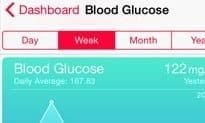10,000 patients using Emis PHR

More than 10,000 people are recording personal health data using Emis Health’s personal health record, which runs on Apple’s HealthKit platform.
The company’s chief medical officer Dr Shaun O'Hanlon said these users have made 2.6 million observations since the product was launched in September last year, recording information such as activity data, weight, pulse and glucose levels.
O'Hanlon, who was speaking at this month’s iLinks event in Aintree, said that peak usage is among people aged 40-49, although there is one user over the age of 100.
The tool can process data from a variety of devices, including blood pressure monitors and wearable fitness trackers, and collate this in HealthKit – Apple’s platform for health monitoring tools.
The data is stored in a secure cloud developed by Emis and is accessible via the Patient Access app, which Emis developed to give patients access to GP records held on Emis Web.
This data can also be added to the patient’s Emis electronic medical record, which is accessible by GPs, provided the patient gives consent.
“That record belongs to a patient. They can choose to share it with their clinicians as and when they want. It’s their record not the GP’s,” O'Hanlon said.
He added that using data contained in a personal health record could support patient interactions with clinicians by giving them access to “real information.”
“If a nurse or GP wants to give lifestyle advice to patients about how much exercise they should take and set objectives on weight loss you’ve got an objective way to start talking about it.
“We can join this lifestyle and health data together so it becomes a continuum and so patients aren’t laden with a long term condition and just end up talking about blood glucose and blood pressures. Instead they can start talking about that self-management lifestyle exercise programme; it all becomes a holistic part of consultation.”
Emis’ PHR is still in its early stages and work needs to be done on how to process and display the wealth of data in way that is more personalised and consumable for patients, said O’Hanlon.
Matt Murphy, managing director for Emis in the UK, added that the company also needs to prove the case that getting the NHS to pay for patients to have access to a PHR would deliver a positive return on investment.
This is especially important considering that those patients most likely to benefit from monitoring of data – elderly people with long-term conditions – are often unable to afford or access the mobile technology needed for a PHR.
To demonstrate its case, Emis is working on several case studies where the local CCG has supplied all the technology to patients with long-term conditions such as hypertension.
“If we can prove they deliver better outcomes then we can start to prove that commissioners’ budgets should be carved out into personal care,” said Murphy.
“There’s sufficient money in the system to pay for that kind of technology. It shouldn’t be the patient that has to invest in that technology. We have to prove those examples are real and they deliver better outcomes.”




